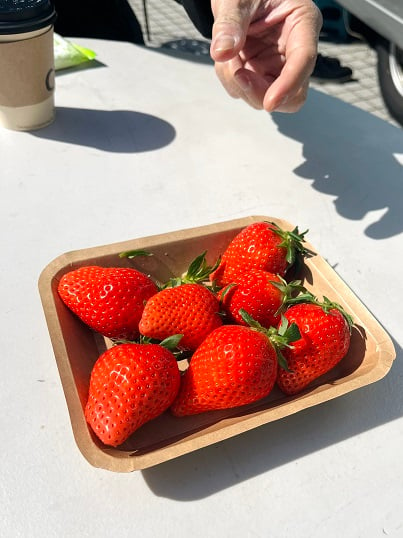Lessons from a perfect strawberry
The morning we went to the farmer’s market in Tokyo, Ruairi and I had overslept. My parents made their way there first and I was worried on the train that they’d gotten lost or had started quibbling. But when we found them at the market, they both had broad, open smiles. Sitting down on a wobbly metal chair, my dad said a little tragically he couldn’t remember the last time he sat down to enjoy the sun. My mom disappeared then re-appeared with a box of strawberries. These strawberries… Each one was plump, radiant, silky sweet. My mom said over and over again like an incantation: best ever; best; best ever.
As we ate, I wondered aloud if we should buy a second box. Nobody else thought so. We’d all had them and that was enough.
Since I was young, I’ve had some trouble bearing the idea that time passes; that moments no matter how good don’t last because a minute arrives after this one, and also a day, a week, a year. Friends will know I’ve tried rejecting this perverse flow of time, vexing over how to elongate parties, replicate them, or capture them in forms that could be eternal. Like flimsy twigs in a gushing stream, they’ve never worked. And so I’ve mostly had to endure it after all: The twinging feeling of letting good and beautiful things pass.
Thankfully, getting older seems to be making this easier. I remember as a kid it used sometimes to physically pain me to sit on the bus home after a perfect day. In college, I learned that happiness wasn’t rationed and I developed reasonable confidence that each good day wasn’t going to be the end of my thin allocation. Now, at long last, I’m coming round to the helpful idea that it’s alright to let things go, even if they’re great. You have to. And it’s okay.
I was in Sarawak, Malaysia last week on assignment and found myself in the home of a 70-year-old woman who is ethnic Bidayuh, one of the major Dayak tribes native to the rivers of Borneo. Among several families, she was the most revered brewer of Tuak, a catch-all term for indigenous rice wine. Aunty Annie —Christian missionaries reached most of Borneo last century — showed us a squat, brown vat in her backyard, tucked underneath lines of drying pajamas. In a mix of Malay and English, she went through her brewing rules: No loud noises; no full moon, no bad moods; no men. When she was done, one of her nieces poured the photographer and I a small cup of Tuak infused with Sarawakian pepper. We both took a sip, then turned to stare at one another. Second sip. We started laughing. Aunty Annie had been brewing Tuak at home for nearly 50 years, refining her technique as she refined her own tastebuds. I felt blessed drinking the Tuak knowing its long, private history but also, more palpably, because it was drop-dead fucking delicious. Clean, light, bracing — I felt like I could drink the whole vat. Aunty Annie had six flavors she wanted us to try, so over a long lunch, we went through them. By the end, the photographer, an impressionable young man from KL, was bright-red and close to crying.
How implausible it was for me to arrive at the kitchen of an old Bidayuh woman. Part of me wishes I could drink her Tuak again but I’m not disappointed knowing I probably won’t. What matters more to me now is that I did have that drink and those strawberries. I was there in those moments of wide-eyed surprise — shared, gratifyingly, with other people.
A few minutes ago, I clicked some buttons to look up the etymology of the word “fleeting.” From Old English flēotan, meaning “to float, drift, flow,” and later, “to fly.” I like a lot the idea of being in flight with other people or by myself through good, beautiful things in this life. It doesn’t need to last. What matters is the act of flying; of taking off and catching air.
On the surface of the black
lake, a swan and the moon
stayed perfectly
still. I knew this was
a perfect moment.
Which would only hurt me
to remember and never
live again. My God. How lucky to have lived
a life I would die for.
Part of the poem "I Went Out to Hear" By Tunisian-American poet Leila Chatti (2023).

This email was written quite rapidly to the music of Japanese instrumentalist Haruka Nakamura, specifically "AOIMORI" and "AOMORI II," the first two instalments of what will be a quartet of albums mapped onto the changing seasons that he's writing for Tsutaya bookstore, a magical place in Shibuya. Two years ago, Haruka filmed a music video for one of his songs on Yururi, an island in Hokkaido that is uninhabited except for a band of wild horses.
Your friend,
Reb